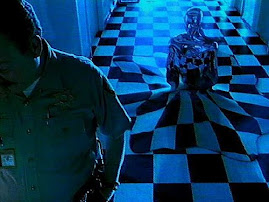But still, the limits of available source materials usable in the scholastic pursuit of the linguistic appreciation of smut were, for the most part, constrained to the acquisition of information primarily through the oral tradition. I mean you were pretty much limited to screaming and recieving variations on the “Your Mother…” paradigm. And while that model served well for much of the later twentieth century -- helping resolve some of the most pressing cultural and social conflicts of the time (at least for those of us in the 12 to 18 year age bracket), it was not until the coming of the information age that the dissemination of verbal filth saw a rebirth, not unlike that experienced in the 18th century age of enlightenment after Guttenberg introduced the printing press, with its astonishing unleashing of ideas that led to an exponential growth in the availability of trivial information about which literally “everyman” could argue both pointlessly and endlessly. In short, it was a good time to be alive!
It is said (probably far more often than necessary) that history repeats itself. In fact, that quotation, arguably, has repeated itself far more often than history ever will. But, more to the point, one would be remiss not to draw parallels between the introduction of Guttenberg’s movable type and Bill Gates’ personal “movable feast” which made “type” itself -- the written word -- available to all, immediately, indiscriminately and ubiquitously. And, of course, once again, it resulted in a new epiphany of knowledge of all sorts; not the least of which was that in the continuing tradition of the pursuit of a new vocabulary of filth.
One almost expects to see a fly in the ointment, in the oil that greases the wheels of progress, no matter in what age technical and social evolution make their great advances. And so, it is no surprise that there are those out there, lurking silently, working by night, unknown faces, cunning and unnamed digital artisans under the employ of some evil and nefarious supervision seeking to thwart the pace of progress. And so it is with our beloved home town paper, the Altoona “Rear View” Mirror -- an institution that has spanned both the 18th and 21st century in one superhuman leap, publishing both by morning in movable type and around the clock through the marvel of the internet -- that the ugly and Orwellian face of censorship of the press has revealed itself. And it has done this in the form of the ugly Altoona Mirror “Smut-Bot”.
The purpose of this evil contraption, this Smut-Bot, is to digitally search and destroy any and all words that might even in the slightest way violate the covenant of political correctness. And it takes no enemies. Collateral damage be damned. With full tolerance for Friendly Fire. It takes the good words out along with the bad. The first and the foremost along with the filth.
Mirror readers are invited to join their community in the fullest sense by inputing their digital comments to many of the articles and editorials appearing daily in the Mirror. And they do. At a furious pace. But they do this only to find that many of their words are deleted without warning by the Smut-Bot. With the speed of the hand of god, it transforms its readers’ words into simple strings of asterisks. Not just obviously “dirty” words. Not just the “f” word. Nor just the word for excrement. Even silly comments like “You might be a redneck… if” turn instantly into cryptic strings of the sort that read: “You may be a ******* if…” And you might expect even that much. But the Smut-Bot is not content with the obvious. It’s mission is to seek out and destroy. But in finding and destroying obvious offenders its sense of power grows. It begins to remove all words that could be potentially construed to be offensive to any group in any way. So, you begin to notice other kinds of words being removed. Words like “Jew”. (Making an ongoing discussion of ,say, the Holocaust all but impossible. Words like “Hell” automatically become transformed into “****”, making the frequently discussed topics of creationism, evolution, religion and the invariable and urgent human need for an expletive, simply unattainable. Even the word “heroin” disappears into a string of asterisks, becoming “ ****** ”, distracting from discussions of community drug problems. No one knows the length of the list of forbidden words, nor of how many new ones are added daily. No one has a copy of the “dictionary of the deleted”. Except that new-age scribe pulling his levers and turning his knobs in the digital dungeon somewhere in lost halls of the Altoona “Rear View” Mirror. Oddly enough, there is still one questionable word that can slip through the Smut-Bot unnoticed: "Transvestite "! I wonder -- does that tell us something about the mysterious keeper of the butt, er, the “Bot”?
So, where are the Tea Parties, the Candle Light Vigils, the angry commentary of talking media heads and talk show hosts to protest this intrusion into free speech? Where are the defenders of words. Of all words. Even dirty words? Where have you gone, George Carlin?
_
_

The Revenge of the Smut-Bot : Is Freedom of Speech a Dirty Word in Altoona, PA? by jimmi malarky is licensed under a Creative Commons Attribution-No Derivative Works 3.0 United States License.
Based on a work at malarkyspond.blogspot.com.
Permissions beyond the scope of this license may be available at http://malarkyspond.blogspot.com/.




















